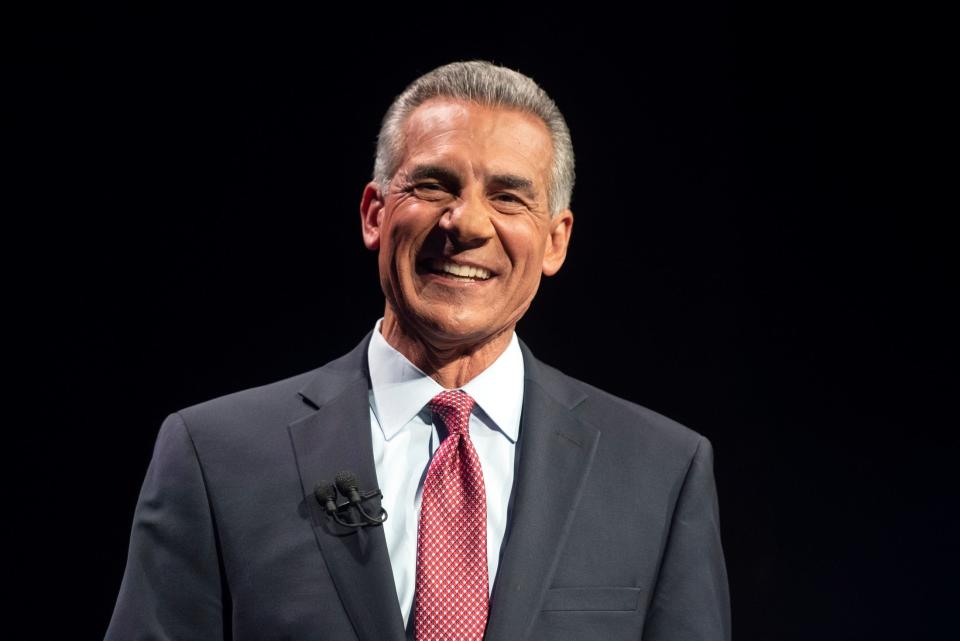NJ's school aid can't pit suburbs against cities. We must be equitable | Ciattarelli
- Oops!Something went wrong.Please try again later.
- Oops!Something went wrong.Please try again later.
When Gov. Phil Murphy introduced his fiscal year 2024 budget a few weeks back, we learned that the $53 billion spending plan — the largest in history, up 47% since the governor was first elected — included a $1 billion increase in state aid to K-12 schools.
This brought a huge sigh of relief to New Jersey’s 600 school districts and their respective boards of education. After all, state aid is critical not only to the quality of education, but also to holding down local property taxes. Every dollar of state aid is one fewer dollar in property taxes.
The devil was in the budget details, however. Despite the $1 billion increase, more than 150 school districts would have their state aid cut. Some cuts would be as much as $5 million (South Brunswick) to $14 million (Toms River) to $51 million (Jersey City). In fact, more than 25 districts would lose $1 million or more.

The winners? Newark’s aid was increased by $114 million; Elizabeth's by $46 million; and Paterson's by $34 million. So the budget would decrease aid to successful school districts and increase aid to districts that are failing children and their parents. Talk about inequitable and ineffective. Making matters worse, Murphy has pretty much blocked school choice in failing districts.
More: NJ has released 2024 school funding figures. See how much will go to your district
Let’s be clear, school funding isn’t about pitting the suburbs against our urban centers. No child or community should ever be disadvantaged or left behind. This is all about equity. To that point, if these state aid numbers don’t make a case for how arbitrary and flawed the current school funding formula is, nothing does.
With all 120 seats in the state Legislature up for election this year, what happened after the budget details were released was vintage partisan New Jersey politics. While Republican state legislators have joined me in calling for real school funding reform, panicked and vulnerable Democratic state legislators called for an emergency meeting with the governor.
Instead of brainstorming and legislating a new and fairer school funding formula that would take effect on day one of the next fiscal year — i.e., July 1 — the meeting resulted in another of those one-time, "kick the can down the road" band-aids.
Suddenly, over one weekend, more than $100 million in "supplemental aid" was found to minimize the decrease in state aid to the losers — the more than 150 school districts that saw cuts in state aid.
And so, at a time when school districts are under enormous fiscal pressure due to learning loss, inflation, the mental health crisis among students, and teacher shortages ... At a time when the governor is proposing a $1 billion increases in overall school funding ... At a time when the governor is sitting on $10 billion in surplus funded by New Jersey taxpayers ... How can we possibly cut state aid to any school district? While some districts may deserve an increase, shouldn’t all others, at the very least, receive the same aid as last year?
More from Jack Ciattarelli: NJ needs a simpler approach to school funding. Here's how it could work
To the great frustration of taxpayers up and down the state, nowhere else in the country is fiscal policy and something as important as school funding so expediently decided and capriciously politicized by a select few.
The governor’s overall state aid to schools also includes a one-time $120 million for "free" full-day pre-K. What Murphy doesn’t say is that cost of pre-K will eventually be the responsibility of the local school district, which will only raise property taxes all the more.
The benefit of early childhood education is well documented. And without question, the cost of private pre-K is, many times, out of reach for a great many parents with 3- and 4-year-olds.
The problem with the governor’s approach is that an overwhelming majority of school districts do not have the facilities to accommodate pre-K. Some of these districts are ones whose aid is being cut, which means they’re being disadvantaged twice, despite the fact that their residents are paying the taxes that fund another district’s increase in state aid and pre-K.
Where is the equity in this policy?
A more equitable approach would be to increase New Jersey’s child care tax credit and/or allocate budget dollars to a pre-K voucher program that benefits those below a certain income level. The voucher would be used to enroll a child in private pre-K. This approach would also better protect private pre-K schools, which are owned by more females than any other business in New Jersey. The governor’s approach will put private pre-Ks out of business, not to mention grow his favorite special interest: the teachers union.
During Murphy's tenure, budget cycles have been marked by expedient, one-time and politicized decision-making. Thus far, this budget season seems no different.
We need a more thoughtful, equitable and pro-business approach.
Jack Ciattarelli, the 2021 Republican nominee for New Jersey governor and a likely 2025 gubernatorial candidate, is a regular contributor to the opinion pages of USA TODAY Network New Jersey publications.

This article originally appeared on NorthJersey.com: NJ school funding must be more equitable jack ciattarelli

